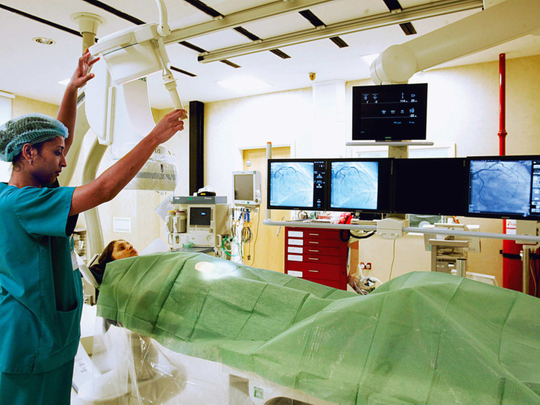
Dubai: High net worth individuals (HNWIs) or family offices in the region are preferring to invest in focused sectors like health care and education expecting growth even as interest rates are looking up amid subdued performance in equity markets so far in the year.
According to a study, private equity raised a record $453 billion from investors in 2017 globally, bringing the available pool of money to invest to $1 trillion. The amount of money raised exceeded the previous record of $414 billion set in 2007.
As far as returns were concerned, health care companies in India have returned 60 per cent in investments on an average of the 23 companies that went public since 2015.
“It took India 40 years to get to a trillion dollar economy, and now we are $2.5 trillion economy. So as economies grow, within that health care grows much faster than other sectors,” Sharma said.
Sharma expects health care and education to be an asset class on its own by 2030-2040 compared to what fixed income and equities were 30-40 years ago.
The opportunities in health care in Dubai and India are immense.
The hospital beds in Dubai increased to 2,434 in 2016 from 1,448 beds in 2012, registering a compounded annual growth rate of 13.7 per cent and shifting contribution by the private sector from 41 per cent to 53 per cent over the same period.
In India too, the opportunity in health care is immense.
“One third of the world’s blind people live in India. We will have 100 million diabetic patients in India by 2020. What we try to do is find companies with huge potential in a risk adjusted manner,” Sharma said.
Difficult
But the private equity deals are difficult to get by after the industry suffered a setback in 2008.
“One of the key thing that we saw in the region in 2007-08 is that there was a lot of momentum investing, which was name lending. So if someone was doing it then it must be a smart thing,” said Sharma from Foundation Holdings, which raises funds from family offices to invest in forms or in acquisitions in health care and education sectors in the GCC and India.
“Everyone was piggy backing themes in that case. So what ended up happening is that when 2008 struck, there was a severe dent in that trust on the entire system. So what happened then is blind pool, blind fund which historically were a preferred route for a lot of investors became a question mark saying that is this the right thing for us to do,” Sharma added.
Family offices then started to realise that they need to take care of their own investments and has been asking for ‘well-screened deals,’ according to Sharma.
“Earlier a lot of early stage loss-making deals were coming to family offices, but private equity and investment firms were getting the well screened deals. That hasn’t changed a lot. Family offices still get the early stage deals, and well-screened, good profitable deals still go to private equity. Allot of family offices said that we need access to those well screened deals,” Sharma said.
Last year, out of the 257 deals that Foundation Holdings studied, they closed three deals, indicating the complex nature of the process.
“Our approach is why put in your money in the seventh best idea, when you have an opportunity to double your money in the first two ideas. The approach that we take is from a portfolio perspective we think having investment in stable sector on a risk-adjusted basis is a good call. How does one get those alpha returns,” he said.
Foundation Holdings has acquired clinics and health care facilities from Mediclinic, among others in the value health care segment and operate now under Right health, which they plan to do an initial public offering later.







